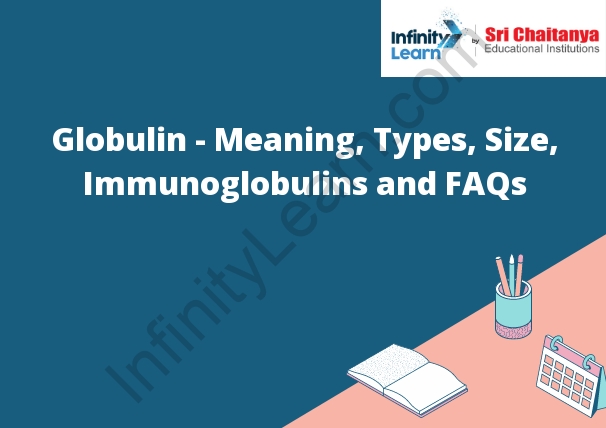Table of Contents
What is Globulin?
Globulin is a protein found in blood plasma and serum. It is the most abundant protein in blood, accounting for about 60% of the total protein. Globulin is composed of several different types of proteins, including albumin, alpha-1-antitrypsin, and immunoglobulins.

Globulin Types
There are two types of globulin: alpha and beta.
Alpha globulin is a protein that helps to transport other proteins in the blood. It is made in the liver and is found in high levels in the serum.
Beta globulin is a protein that helps to transport lipids in the blood. It is made in the liver and is found in high levels in the serum.
Size of Globulin
Globulins are a family of proteins that are present in blood plasma. They are produced by the liver and play a role in the immune system. There are four main types of globulins: albumin, alpha-1 globulin, alpha-2 globulin, and beta globulin. Albumin is the most common type and makes up about 60% of all globulins. Alpha-1 globulin makes up about 20% of all globulins, alpha-2 globulin makes up about 10% of all globulins, and beta globulin makes up about 10% of all globulins.
Human Blood Plasma Level
Human blood plasma levels are usually about 55% water. The water in the plasma carries dissolved substances, such as salts and glucose, and helps to regulate the body’s temperature.
Non Human Globulin
Non human globulin is a protein found in the blood plasma and serum of animals. It is used as a medication to treat and prevent infections, particularly hepatitis B. Non human globulin is also used as a blood transfusion product.
Pseudo Globulins and Euglobulins (globulins)
Pseudo globulins and euglobulins are globulins. Pseudo globulins are proteins that are not globulins, but are similar in size and shape. Euglobulins are globulins that are not proteins, but are similar in size and shape.
Globulin Test
A globulin test is a blood test used to measure the levels of a type of protein called globulins in the blood. Globulins are a type of antibody that help fight infection. They are also involved in the immune response to foreign substances. The globulin test is used to help diagnose and monitor conditions that affect the immune system, such as lupus, rheumatoid arthritis, and hepatitis. It can also be used to monitor the effectiveness of treatment for these conditions.
Immunoglobulins
Immunoglobulins are glycoproteins that are found in the blood and lymph. They are produced by plasma cells in response to an antigen. Immunoglobulins have two heavy chains and two light chains. The two heavy chains are linked by a disulfide bond, and the two light chains are linked by a disulfide bond. Immunoglobulins are classified into five groups according to their heavy chain.
IgG is the most common immunoglobulin. It is found in the blood and lymph and is produced by plasma cells in response to an antigen. IgG is a monomer and has two heavy chains and two light chains. The two heavy chains are linked by a disulfide bond, and the two light chains are linked by a disulfide bond. IgG is the only immunoglobulin that can cross the placenta and provide immunity to the fetus.
IgA is the most common immunoglobulin in the saliva and tears. It is found in the blood and lymph and is produced by plasma cells in response to an antigen. IgA is a monomer and has two heavy chains and two light chains. The two heavy chains are linked by a disulfide bond, and the two light chains are linked by a disulfide bond.
IgM is the most common immunoglobulin in the serum. It is found in the blood and lymph and is
Clinical Application of Globulin
A globulin is a type of protein that is present in blood plasma and other body fluids. Globulins are important in the body’s immune system and help to fight infection. They are also involved in the transport of cholesterol and other fats in the blood.
There are several different types of globulins, including immunoglobulins (Ig), serum albumin, and transferrin. Immunoglobulins are the most important globulins, and they are made up of several different proteins, or antibodies, that help to protect the body from infection.
There are several different types of immunoglobulins, including IgA, IgG, IgM, and IgE. Each type of immunoglobulin has a specific role in protecting the body from infection.
IgA is found in tears, saliva, and mucus. It helps to protect the body from infection by preventing bacteria from entering the body.
IgG is the most common type of immunoglobulin. It is found in blood and other body fluids and helps to protect the body from infection by attacking bacteria and viruses.
IgM is found in large amounts in blood serum. It helps to protect the body from infection by attaching to bacteria and viruses and destroying them.
IgE is found in small amounts in blood serum. It helps to protect the body from infection by attaching to allergens, such as pollen or
Control of Gene Expression
In prokaryotes, gene expression is controlled by structures called promoters and operators.
Promoters are DNA sequences that bind to proteins called transcription factors.
Operators are DNA sequences that bind to proteins called repressors.
In eukaryotes, gene expression is controlled by structures called promoters, enhancers, and silencers.
Promoters are DNA sequences that bind to proteins called transcription factors.
Enhancers are DNA sequences that bind to proteins called transcription factors.
Silencers are DNA sequences that bind to proteins called transcription factors.
Globulin Test Contradiction
A globulin test is a blood test that measures the amount of a certain type of globulin in the blood. Globulins are a type of protein that are found in the blood. They are produced by the body’s immune system and are responsible for fighting infection. There are three types of globulins: alpha, beta, and gamma. The globulin test measures the amount of gamma globulin in the blood.








